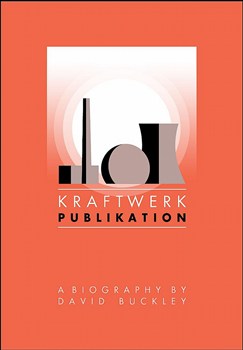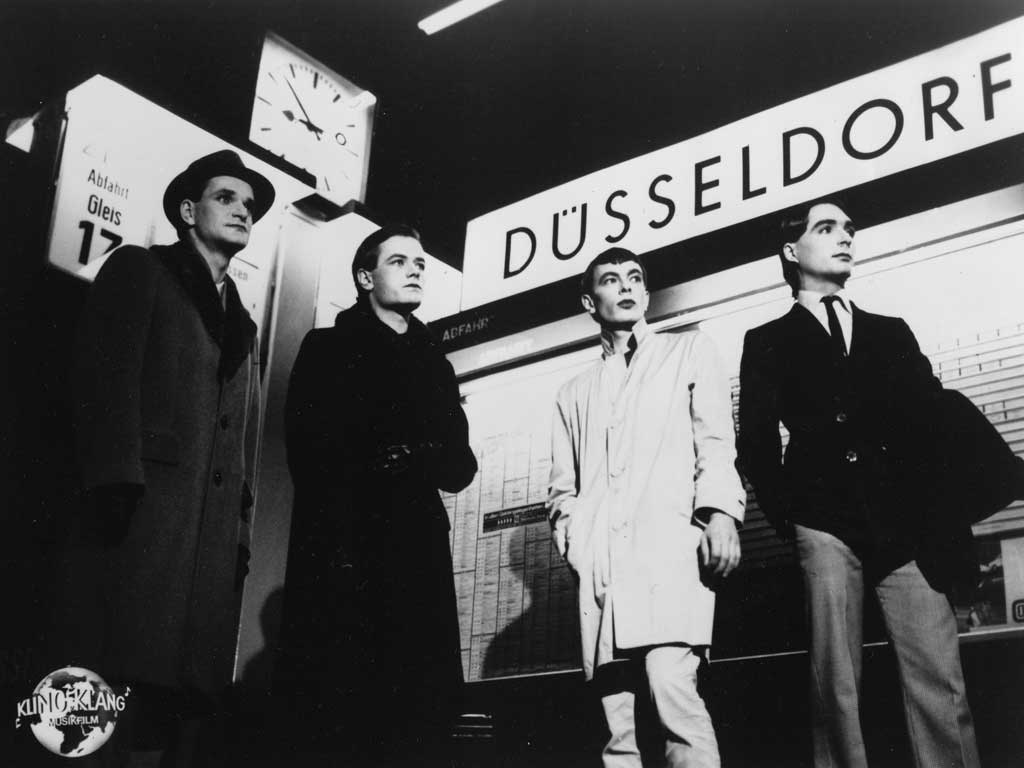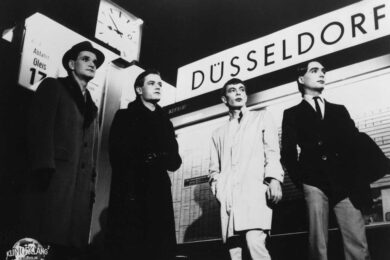3.5 ‘Tomorrow Belongs To Those Who Can Hear It Coming’*
It wasn’t just young would-be musicians who were listening either. The old guard were listening too. In 1975, modern music’s most important icon, David Bowie, was listening hard to Kraftwerk. Receiving an endorsement from Bowie, at the time the most innovative and critically lauded rock star on the planet, was a big deal. It’s hard now to imagine how influential David Bowie was in the seventies and early eighties. Far and away the most sought after interviewee by the UK music press, his every move was scrutinised, his every word picked over by an adoring audience.
Not that 1975 was personally a good year for Bowie. Commercially, he had never been more popular. ‘Fame’, an unlikely collaboration with John Lennon, became his first US number one, and a re-released ‘Space Oddity’ from 1969 would top the UK charts later that autumn. But physically and emotionally, Bowie was a man of shellac, ready to shatter into pieces, addicted to cocaine and obsessed with the occult. However, amongst the nonsequiturs and ridiculous assertions in his interviews, Bowie was, once again, picking up on a massive shift within modern music. He felt that rock, as a statement, was over. His music of the time, dubbed by its creator ‘plastic soul’, was his first attempt to break free from rock cliché. His second attempt, more fully realised, and
much more artistically successful, would be just around the corner. ‘Rock ’n’ roll certainly hasn’t fulfilled its original promise,’ he told Anthony O’Grady in August of that year. ‘The original aim of rock ’n’ roll when it first came out was to establish an alternative media speak voice for people who had neither the power nor advantage to infiltrate any other media or carry any weight, and cornily enough, people really needed rock ’n’ roll. And what we said was that we were only using rock ’n’ roll to express our vehement arguments against the conditions we find ourselves in, and we promise that we will do something to change the world from how it was. We will use rock ’n’ roll as a springboard.’ Bowie continues: ‘But it’s just become one more whirling deity, right? Going round that never-decreasing circle. And rock ’n’ roll is dead … It’s a toothless old woman. It’s really embarrassing.’
Bowie picked up on the ennui that many felt at the time. Glam
rock was over, and there seemed nothing new to replace it with. One solution came from punk. But Bowie’s solution was to look not to New York’s CBGBs or to Malcolm McLaren’s Sex fashion emporium,
but to Continental Europe, and to Germany. The first inkling of
Bowie’s new direction, at first a powerful mixture of hard, neurotic funk with brash synthesizers, came in January 1976. The title track to his Station To Station album began not with a piano chord progression (as had Hunky Dory), a drum figure (Ziggy Stardust), a power chord (Aladdin Sane), a theatrical canine yelp (Diamond Dogs) or a swinging Latino drum beat (Young Americans), but with
a carefully faded-in wash of white noise which ran from speaker to speaker. The listener was truly ambushed. This was not rock music; this was not pop music. The Doppler effect of a speeding train gave way to a slow, mesmeric pulse, an incantation, a spell as a disturbing refrain repeated with a demonic intensity. Bowie’s vocal, when indeed it came – but not until a third of the way through this nine minute experimental piece – was now so excessively overwrought as to remind us not of rock at all, but of theatre, of electro-cabaret.
Paul Buckmaster recalls Bowie playing him Kraftwerk’s music in LA when the two were working on the soundtrack to the Nic Roeg film The Man Who Fell To Earth in the late autumn of 1975:
‘We listened a lot to the Kraftwerk albums, Autobahn and Radio-
Activity. We also listened to some classical stuff, including Richard Strauss (not ‘Also Sprach Zarathustra’!).’ ‘I was fascinated and tickled and amused by them,’ continues Buckmaster. ‘We both enjoyed their records very much indeed. We kind of took them seriously, but we kind of laughed as well. Not at it, but because the music had a kind of innocent quality which was very fetching, and a deadpan humour as well.’
Bowie’s 1976 Station To Station tour confirmed the
Europeanisation of his muse. Known by fans as the ‘White Light’
tour, Bowie lit the stage in varying intensities of white light. Bowie himself was dressed in austere monochrome, the only flash of colour his swept back red hair and a glimpse of the pale blue packet of French Gitanes cigarettes that he kept in the pocket of his black waistcoat. ‘The staging of the performance was inspired,’ wrote Michael Watts in Melody Maker. ‘Using an overhead bank of neon lights, and the auxiliary power of Klieg, he exposed the stage in a brilliant glare of black and white expressionism that emphasised the harshness of the music and reflected upon his own image as a white-shirted, black-suited creature of Herr Ishyvoo’s cabaret. It was, I think, the most imaginative lighting of a rock concert I have ever seen.’
The support slot for the tour had been offered to, and turned
down by, Kraftwerk, thus beginning a pattern of saying ‘No’ which
has continued to this day. Kraftwerk, as we will see, have said no to so many ideas, to so many people, and for so long, that rejection, dismissal and moving forward only through a process of rejection is without question their guiding philosophy. Wolfgang Flür: ‘It is easy to understand why they turned him down. It is the same policy that they use today, to be absolutely on their own. No mixing with enemy cultures; not “enemy”, but foreign cultures. Nothing completely influenced by other music styles, cultures, instruments, sounds or countries … We had to be on our own, self-referential. That was their decision.’ Kraftwerk had missed the chance of playing to hundreds of thousands of fans in Europe and America. It would, in all probability, have broken Kraftwerk globally.
Bowie, in effect, still used Kraftwerk as tour support. As the
crowds entered the arenas – among them, in Detroit, on March 1,
1976, a 17-year-old Michigan girl called Madonna Louise Ciccone
– selections from their latest record, Radio-Activity, were played at concert-level volume to accompany Luis Bunuel’s silent twenties classic film, Un Chien Andalou, which was projected on to a screen at the rear of the stage. The sight of a scalpel slicing through an eyeball, accompanied by the eerie new music from West Germany, provided exactly the right sort of feelings of dissociation in the audience before Bowie’s (literally and aesthetically) blinding performance.
It’s hard to decide which influenced Madonna more: Bowie’s
stunningly visual show or the unrelenting rhythmic pulse of
Kraftwerk’s introductory music. Either way, both would become key
elements in the work of the most commercially successful female
singer of all time.
3.6 ‘Five-Minute Standing Ovation’
Bowie and Iggy Pop toured America and Europe in the spring of
1976, and Bowie introduced Kraftwerk and a very Kraftwerkian song
to his friend. ‘The big one for me was Radio-Activity,’ remembers
Iggy Pop of his 28-year-old self (then an almost unthinkably old age for a rock star to be). ‘I would go to sleep at night listening to ‘Geiger Counter’.’ Bowie had written a new song, ‘Calling Sister Midnight’ which, with typical Bowie largesse, he gave to Iggy. Perhaps more than any of the other songs Bowie was writing at the time, this was the one most influenced by Kraftwerk – it was slow, jarring, a mix of the freedom of funk and the robotic discipline of the synth. ‘Sound as texture, rather than sound as music. Producing noise records seems pretty logical to me,’ Bowie told Rolling Stone. ‘My favourite group is a German band called Kraftwerk – it plays noise music to “increase productivity”. I like that idea, if you have to play music.’
Maxime Schmidt, the manager of Kraftwerk’s French record label and friend of the band, recalled one oft-quoted meeting between Ralf and Florian and Bowie and Iggy: ‘It was in Paris, after one of Bowie’s concerts,’ he told writer Pascal Bussy. ‘He had hired
the L’Ange Bleu nightclub on the Champs-Elysées for a private party. When we arrived there was Bowie, Iggy Pop and their court,
and when Ralf and Florian walked in they received a five-minute
standing ovation. Iggy Pop was gazing devotedly at them, he
completely adored them. Both he and Bowie were transfixed, Bowie
was saying to Iggy Pop, ‘Look how they are, they are fantastic!’”
Not that the band were unappreciative of Bowie’s support. ‘That was very important for us, because it linked what we were doing with the rock mainstream,’ said Ralf in 1991. ‘Bowie used to tell everyone that we were his favourite group, and in the midseventies the rock press used to hang on every word from his mouth like tablets of stone. We met him when he played Düsseldorf on one of his first European tours. He was travelling by Mercedes, listening to nothing but Autobahn all the time.”
Wolfgang claims that Bowie was even keen to record with
Kraftwerk. ‘He was so fanatical about it, wanting to do a record
with us, to co-produce with us. We should co-produce with just him [Wolfgang says this as if it was the clear message they were getting from Bowie at that time]. He wanted to produce his next album with Kraftwerk. That was the reason that he was in Düsseldorf sometimes. I was not invited to these meetings: it was Ralf’s thing, Florian’s thing – they are the masters of Kraftwerk. In the end, finally, they decided against co-productions; and they have their reasons. We loved him [David Bowie], and he loved us. He is a very mild man, he is an educated man. He has a very good aura, fantastic.’
Karl Bartos, however, remembers differently: ‘Yes, Hütter and
Schneider did meet up with Bowie and Iggy in Düsseldorf but I can
honestly say that I have no recollection that a collaboration was at any time intended, although we all worshipped Iggy Pop and David Bowie. We went to Frankfurt to see the Station To Station tour. It was so super-good with the wall of neon lights.’
In a 1995 interview, Bowie denied there was ever a serious
intention to record with Kraftwerk. ‘We met a few times socially but that was as far as it went,’ he said before explaining how different his own modus operandi was to theirs: ‘My attention had been swung back to Europe with the release of Kraftwerk’s Autobahn in 1974. The preponderance of electronic instruments convinced me that this was an area that I had to investigate a little further. Much has been made of Kraftwerk’s influence on our Berlin albums. Most of it lazy analyses I believe. Kraftwerk’s approach to music had in itself little place in my scheme. Theirs was a controlled, robotic, extremely measured series of compositions, almost a parody of minimalism. One had the feeling that Florian and Ralf were completely in charge of their environment, and that their compositions were well prepared and honed before entering the studio. My work tended to expressionist mood pieces, the protagonist (myself) abandoning
himself to the “Zeitgeist”, with little or no control over his life. The music was spontaneous for the most part and created in the studio.’
And so, we don’t know if there was ever a serious meeting
of minds. What is known is that the Bowie camp and the Kraftwerk
camp were on friendly terms. Iggy Pop was Bowie’s travelling
companion during the 1976 tour, and the two would tour again in
early 1977, this time with Bowie playing piano in Iggy’s band: ‘I went shopping once for asparagus with Florian Schneider! I met the two of them, and he suggested, ‘If you like, it is the asparagus season and I am going to the market to select some asparagus, would you like to come along, and I said, ‘Yes, I would. We had a very nice time doing that!’
‘I like them as people very much, Florian in particular. Very
dry,’ said Bowie in 1978. ‘When I go to Düsseldorf they take me to cake shops, and we have huge pastries. They wear their suits. A bit like Gilbert and George, actually, God, whatever happened to those two? I used to really like them… When I came over to Europe – cause it was the first tour I ever did of Europe, the last time – I got myself a Mercedes to drive myself around in, cause I still wasn’t flying at that time, and Florian saw it… He said, “What a wonderful car”, and I said, “Yes, it used to belong to some Iranian prince, and he was assassinated and the car went on the market, and I got it for the tour.” And Florian said, “Ja, car always lasts longer.” With him it all has that edge. His whole cold emotion/warm emotion, I responded to that. Folk music of the factories.’
* Strapline used to promote Bowie’s “Heroes” album in 1977. There is also a German echo. ‘Tomorrow Belongs To Me’, written by John Kander and Fred Ebb for the stage show Cabaret, was imported into the film version where, chillingly, the families gathered around their lunch tables pick up the song in adulation of the Nazi ideal.

Publikation is out now on Omnibus



